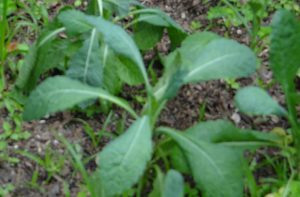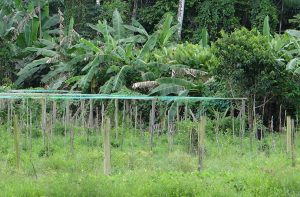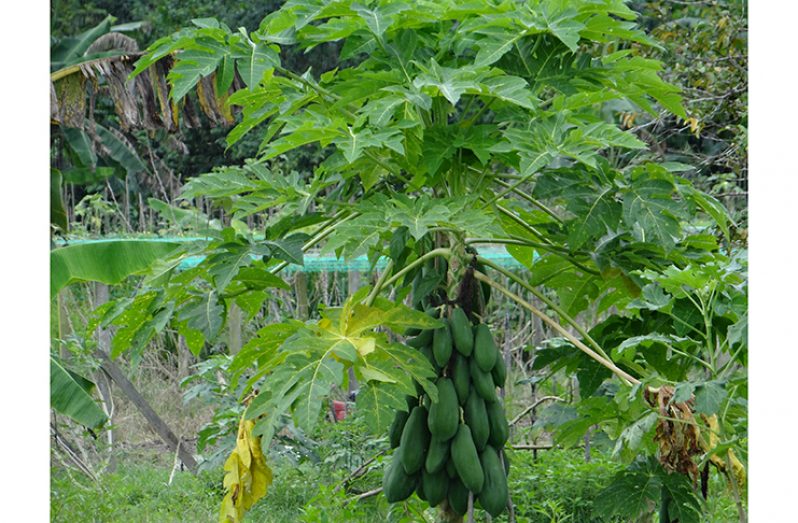By M Margaret Burke
IMPROVED security of farm labour is one of the defining features of family farming (FF) in countries throughout the Caribbean region. A study done by the Inter-American Institute for Cooperation on Agriculture (IICA) delegation in Guyana, reported that family members provide most of the labour needed for the farming operations and that this feature is critical, since limited access to productive labour has been a standard complaint of farmers in all countries in the Region.
“Involving younger family members in farm operations not only mitigates the labour issue (shortage, cost and capacity) but also stimulates innovation in farm operation and management practices where labour-saving technologies are tried, adapted and introduced to reduce the drudgery, time and problems associated with manual operations.
The study noted that family members committed to achieving farm productivity to boost profitability will be more inclined to adopt improved practices, innovation and technology, which are essential to transforming the farm into a commercially-run operation.

It cited the Dolly and Ennis’ 2017 study, which described this benefit of the family farm (FF) business model as leading to ‘an improvement to the integrity of the farm labour force, e.g., greater commitment, trust, more structured family, improved efficiency and apparent modelling of purposeful work by family member, which may also minimise the pilfering of resources from the farm.
RURAL SOCIO-ECONOMIC VITALITY
According to the study, family farmers enhance the vitality of the rural economy and preserve traditional cultures. The global experiences provide sufficient evidence of stronger social linkages or ties of the family to the wider community. Further, it stated that as a result successful family farm units will lead to more dynamic and vibrant host communities, including as a source of employment for the growing business as well as spawning of other small-scale or artisan community enterprises that provide goods and services to the family farm unit.
The study highlighted a practice in Argentina and Brazil, which it said is apparently to link family farm to community markets, such as school feeding and hospitals. This facilitates income growth based on peer pressure to ensure quality.
BUSINESS-ORIENTATED FARMING
The study disclosed that the traditional mindset of small farmers is to grow and sell. It said that good practices, adherence to standards as well as safety and quality issues have been introduced over decades, as studies will confirm.
These, according to the study still present issues and challenges in the current period. The apparent slow uptake of regulations in a largely non-regulated farm sector is blamed on the ‘lack of a business approach’ in farming. There is great potential for this constraint to be more effectively addressed and reversed through strong family farming units.
“A farming family, intent on using the farming business to support the family and to diversify the economic opportunities from the farm, will employ the basic principles of good business; will be more inclined to adopt an entrepreneurial mindset, and embrace business-enhancing practices and technologies. The incentive is to leave behind a healthy income-generating business, centred on the farm, to heirs and successive generations. If this inter-generational family dynamic is absent, then the drive to approach farming as a business will be less strong,” the study disclosed.
MODERNISED FARMING – YOUTH INVOLVEMENT
The study focused its attention on the Youth in Guyana, as well as in the other countries studied. It disclosed that the youth are more inclined to adopt innovation and to innovate.
“Their [the youth’s] full involvement in the family farm business significantly increases the likelihood of a technology and innovation transition on the farm that leads to continuous productivity improvements and diversified farming operations,” the study revealed.
ABILITY TO MEET NEEDS
The study showed that a typical feature of the family farm is the way labour is distributed among family members within the business. It posited that families come with a range of skills across generations and should ensure that the family farm provides opportunities for the young members to acquire training and qualifications in skills and competencies that strengthen the business.
“The capacity to significantly improve marketing and promotion of farm products will be a boost to the sector in general, particularly given the inclination of the youth to use of social media platforms and network marketing tools. This could revolutionise the traditional concept of ‘niche marketing’ driven by dynamic family farm units” the study documented.
Diversify and develop the product
According to the study, experience has shown that promoting value-adding to farm output is an important avenue to maintain the dynamism of the farming enterprise across generations. It is now well appreciated that some form of value adding – even as simple as cutting and packaging fresh output for fresh, chilled, frozen market – becomes a logical extension to the farming operation to enhance income opportunities and reduce waste in operations.
It has also been shown that female family members are more inclined to start and grow these linked value-adding operations. Therefore, enabling family farm as an agribusiness model helps to mitigate the constraints of ‘marginalisation of women in agriculture’, ‘limited post-farm linkages, including production of value-added products’, and ‘limited integration of the local farm sector into value chains and the wider productive economy.
SMART PRACTICES
The strong culture of family farming within and throughout many generations “will ensure good stewardship of the core asset that must transition from generation to generation to sustain the farming enterprise.

“Cultural attachment to farming and land, particularly on long-owned family holdings, also plays a major role in the sustainability of family farms. Maintaining the farm unit also removes the problem of land sub-divisions into smaller and less economic units, and or ‘selling-off’ of family land thus mitigating the indefinite fragmentation of agricultural land,” the study informed.
The study documented its findings after careful investigations on family farms in Guyana, Jamaica, Haiti and Saint Vincent and the Grenadines. It discovered tremendous similarities in the patterns of family farming within all of these countries and recommended in part:
“Developers and policy-makers should effectively synchronise developmental initiatives with the culture of the farm family to ensure that the intended development captures the norms and values of the FF system… A key and immediate recommendation is the inclusion of family farm (FF) data in future agricultural censuses within the Caribbean…”(mercilinburke2017@gmail.com)



.jpg)








